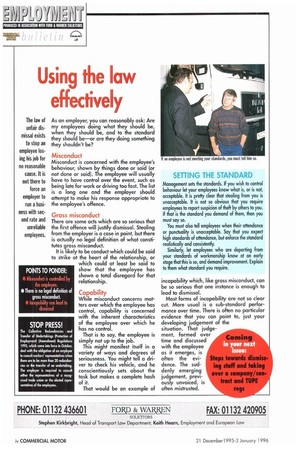Using the law effectively
Page 66

If you've noticed an error in this article please click here to report it so we can fix it.
As an employer, you can reasonably ask: Are my employees doing what they should be, when they should be, and to the standard they should be—or are they doing something they shouldn't be?
Misconduct
Misconduct is concerned with the employee's behaviour, shown by things done or said (or not done or said). The employee will usually have to have control over the event, such as being late for work or driving too fast. The list is a long one and the employer should attempt to make his response appropriate to the employee's offence.
Gross misconduct
There are some acts which are so serious that the first offence will justify dismissal. Stealing from the employer is a case in point, but there is actually no legal definition of what constitutes gross misconduct.
It is likely to be conduct which could be said to strike at the heart of the relationship, or which could at least be said to show that the employee has shown a total disregard for that relationship.
Capability While misconduct concerns matters over which the employee has control, capability is concerned with the inherent characteristics of the employee over which he has no control.
That is to say, the employee is simply not up to the job.
This might manifest itself in a variety of ways and degrees of seriousness. You might tell a driver to check his vehicle, and he conscientiously sets about the task but makes a complete hash of it.
That would be an example of incapability which, like gross misconduct, can be so serious that one instance is enough to lead to dismissal.
Most forms of incapability are not so clear cut. More usual is a sub-standard performance over time. There is often no particular evidence that you can point to, just your developing judgement of the situation. That judge ment, formed over time and discussed with the employee as it emerges, is Steps towar often the evi dence. The suding staff and taking denly emerging over a company/con judgement, previtract and TUPE ously unvoiced, is often mistrusted. regs




























































































































